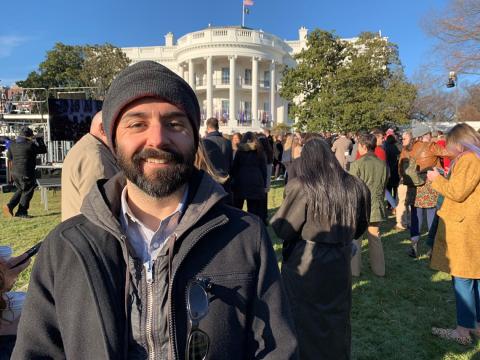‘A Special Moment’
NHLBI’s Rodriquez Witnesses Signing of Marriage Law at White House

Last December, President Joe Biden signed the Respect for Marriage Act—landmark legislation enshrining federal recognition of same-sex and interracial marriages into law.
Dr. Erik Rodriquez was among the more than 2,000 attendees who witnessed the signing of the legislation at a celebratory event on the South Lawn of the White House.
“This was a once-in-a-lifetime experience. It was a special moment that will be etched in my memory for years to come,” said Rodriquez, staff scientist in the NHLBI lab of Dr. Eliseo Pérez-Stable, director of the National Institute on Minority Health and Health Disparities (NIMHD).
The bill has personal relevance for Rodriquez, who has been married to his husband for more than six years and partnered with him for more than 13 years.
“The signing is important to me in a couple of ways,” said Rodriquez. “One, it makes my marriage equal to everyone else’s, and two, it enshrines protections other marriages have had for a long time.”
As he reflected on the day, Rodriquez said it was especially moving because he grew up in a homophobic community. The new law ensures federal marriage recognition regardless of sex, race, ethnicity, or national origin. It also repeals the Defense of Marriage Act, which established a federal definition of marriage as a “legal union between one man and one woman as husband and wife.”
Since the Supreme Court’s ruling in Obergefell v. Hodges in 2015, same-sex marriage has been legal. But when the court overturned Roe v. Wade in summer 2021, it raised the alarm about what would happen to same-sex and interracial unions if the court also overturned those rulings.
As a result, there was a renewed drive for the bill to safeguard these unions; it passed through Congress quickly.
While this is a big step in the right direction, Rodriquez emphasized that more needs to be done for the LGBTQ+ community. For example, he noted that an amendment to the bill allows religious organizations to refuse to provide services, host or officiate wedding ceremonies that conflict with their beliefs. Additionally, he underlined the need for action around violence, equal access and equitable treatment of trans individuals.
In a recent blog, Pérez-Stable noted that sexual and gender minority (SGM) populations (including lesbian, gay, bisexual, transgender, or queer) continue to face stigmatization, hate-related violence and discrimination.
As a result, NIMHD has invested resources that support research on the role discrimination plays in SGM health disparities. The institute has also collaborated with the NIH Sexual & Gender Minority Research Office and other agencies to commission a recently published study, Measuring Sex, Gender Identity, and Sexual Orientation.
The study is an important resource to support much-needed standardized data collection on sexual orientation and sexual identity.
Since working at NIH, Rodriquez has found solidarity in Salutaris, the NIH Sexual and Gender Minority Employee Resource Group.
Initially established in the 1980s, Salutaris works toward cultivating an open and inclusive environment at NIH for all sexual orientations and gender identities. Through his participation, Rodriquez has seen NIH be supportive of LGBTQ+ staff and start to listen to their concerns.
“In light of the federal government’s ‘lavender scare’ that started in the 1950s and their policies like ‘Don’t Ask, Don’t Tell,’ NIH is turning the corner and recognizes what equality and inclusion mean,” Rodriquez says.
